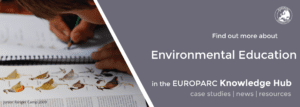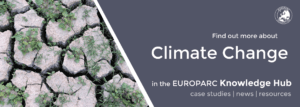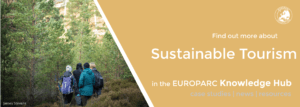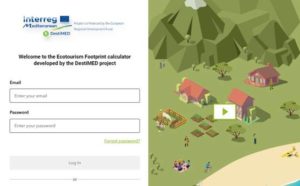#HabitatHeroes Pioneers from the Biebrza National Park
Biebrza National Park in Poland protects one of the biggest fens in Europe. The Park’s Junior Ranger Programme runs since 2014 and until now remains the only one in the country. Read about how the Habitat Heroes from the Biebrza National Park help to protect their ‘natural treasure’ – the Biebrza river and its beautiful valley.
Meet our #HabitatHeroes: Junior Rangers of the Biebrza National Park
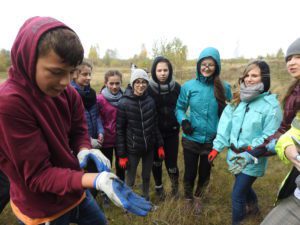
Junior Rangers of Biebrza National Park
Tell us all about your “natural treasure”: Which is the species or habitat you learn and work with the most in your Protected Area?
Our “natural treasure” is Biebrza river and its beautiful valley. The Biebrza National Park protects one of the biggest fens in Europe. The area is really huge, it covers 59 223 ha and is the largest national park in Poland. The Biebrza Wetlands are renowned throughout Europe as important breeding, feeding and stop over site for many waterfowl and wetland birds. For such endangered species as the aquatic warbler, spotted eagle or great snipe, the Biebrza Valley is one of the last remaining refuges in Europe. Over 270 species of birds were recorded here.
In Biebrza National Park, you can see how European lowland rivers looked like many years ago.
Biebrza is famous for a large number of elk (700 elks) and few wolf families living here, too. So, briefly about our „natural treasure”: little civilization, a lot of space and silence, silence, silence…
What is special about it?
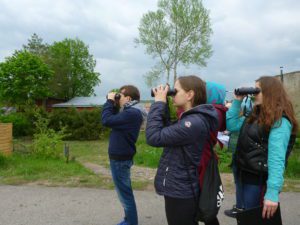
Biebrza National Park
We (participants and mentors of JR group) spend a lot of time on the river, because we have lived close to it since we were born. We love swimming in the river every summer. Some of the pupils are from farming families and they work in the meadows with their parents, e.g. to collect hay. Some boys, sometimes also girls like fishing. We love kayaking too.
We want to help to save this nature. Every year, we help amphibians during their spring migration. We take care of tourist routes and clean them. There are a lot of birds on Biebrza, our goal is to know them, so we learn to recognize species on every our trip.
We also learn about daily duties of park employees. In the past years (2016-2019), we have been helping with the removal of alien invasive plant species.
Describe to us what you and your fellow Junior Rangers are doing/will do to learn more and protect your natural treasure.
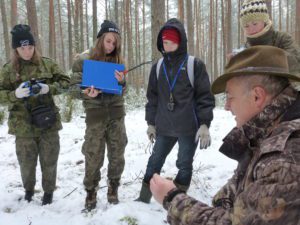
Biebrza National Park
„Know more” – every year we have 2-3 lectures with Park employees and 2-3 trips to the Park. These are outdoor learning combined with work, e.g. ornithological trip, or exploring flora. It is a good opportunity to do some practical nature conservation activities and to learn more about the Park.
We Save the Amphibians is a 5 weeks activity that takes place every spring time, since 2008.
Every spring, we save hundreds of amphibians from a death under the wheels of cars.
Biebrza NP protects amphibians on migration routes, using special hurdles, along the road near Goniądz. It helps to protect the animals from death under the wheels of cars. Every morning and evening Junior Rangers from Goniądz removed amphibians from the buckets and move them to the other side of the road. The number of rescued amphibians in 300 meters along the fen ranges from 200 to 5000 each season.
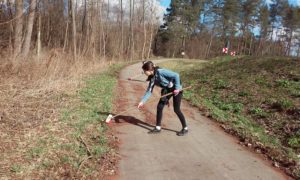
Source: Biebrza National Park
„Clean up the world”: we remove garbage on tourist routes on every our trip, clean the GreenVelo bike trail, sometimes we clean soldiers’ graves in the cemetery and in the forest, we paint fences on tourist routes, and wash education boards.
We remove and try to eliminate invasive species, growing near the tourist trail. In 2014 we focused on Robinia pseudoacatia, while in 2016 and 2018 on Impatiens parviflora.
We protect the Natura 2000 habitats. The last action (November 2019) consisted in the collection and removal of old branches and branches lying on thermophilic grasslands. They adversely affect the habitat, shading and causing changes in the species composition, and result in a loss of plants. We managed to clean a large area of grasslands around the Park’s tower.
Do you also teach others?
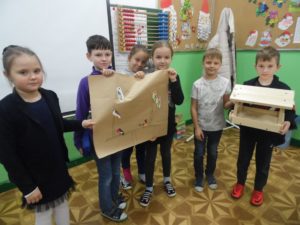
Biebrza National Park
We do educate others. Once a year, we prepare and conduct classes for kindergarten and our younger school friends, children aged 3-10 (approx. 100 pupils). There were events with different topics such as: Elk Day, Animal Tracks in the snow, and “We help birds in winter” campaign, in which we showed how to build feeders and how to feed birds.
For the 100 years of Polish Independence Day we organised an event for children „White-tailed eagle – our emblem“. We made a special small nature theatre for pre-schoolers. We work as animators at the educational stand at various educational picnics like: Wetland Day, Elk Run, Bee Day. It’s hard work, we work sometimes several hours as volunteers to assist in games for families with children.
As Junior Rangers, we try to accompany Park employees in their work.
Our Junior Rangers participate in monitoring of Pasque Flower Pulsatilla pratensis, Pulsatilla patens; moose and birds counting, and autumn insect searching.
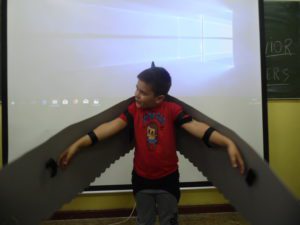
Biebrza National Park
Every year we have a 2-3 day Junior Rangers Camp in Biebrza National Park. In this year camp (May 2019), which was dedicated to protection of wild pollinating insects, we built 15 hotels for insects. Employees of the commune office put them to green places in our town, Goniądz.
We also joined a programme called School Safari 2019/2020. In the framework of this project, we organise activities like lottery, or baking Christmas elk gingerbreads for children in Tanzania.
More about Biebrza national Park
Our team consists of about 20-30 pupils from small city Goniądz, located on the river. Every year some new pupils join to JR Program. The Biebrza NP cooperates with the local school. The group has volunteer mentors – teacher Mrs Irmina Sosnowska and Ewa Wiatr from Biebrza NP. We have support from the municipal office, too – which provides a free bus for trips.Check the Park’s Facebook page to learn more.
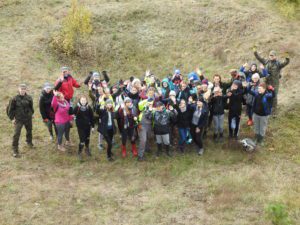
Junior Ranger Biebrza National Park
Learn more and keep track of #HabitatHeroes campaign activities!
Since 2018 we are “mapping the field” and raising awareness for the great work Junior Ranger groups are currently doing for threatened flora, fauna and habitats in Protected Areas and Natura 2000 sites in particular.
- Visit the “Habitat Heroes” campaign website: For now, we are thrilled to introduce you to our Habitat Hero campaign pioneers – groups already taking action. You will find a growing map and overview of Junior Ranger groups.
- Besides, you will meet our “Habitat Heroes” in dedicated articles – make sure you follow our news!
- Keep an eye on social media – the #HabitatHeroes will provide you with exciting updates from our Junior Ranger groups that take part in the campaign. Don’t forget to share their actions!
Want to join the campaign? We are happy to learn about your conservation action – just drop us a mail: f.minozzi@europarc.org
Grand opening of the Mobile Film Festival: ACT NOW on climate change
The 15th Mobile Film Festival (MFF) opened its ACT NOW edition in partnership with YouTube Creators for Change and United Nations Climate Change (UNFCCC). The online film festival is running from 14th to 30th of November and invites the public to watch the 50 selected films, coming from 24 countries.
ACT NOW on climate change!
Following the international call for 1 minute-long mobile films, the festival organizers received more than 800 films from 91 countries. It is a record for the MFF in terms of diversity.
Coming from 5 continents, both from big cities and the countryside, the directors have chosen to support the incredible youth movement initiated by Greta Thunberg, which brings together millions of people from all over the world.
Read more about the rules and goals of this Mobile Film Festival edition.
The Film Festival aims to support this movement through all kinds and genres of stories – be it joyful or sad, funny or absurd, promising or desperate. The genres represented in the selection include thriller, animation, documentary, science fiction…and particularly humor!
Those stories are intended for both young and old people. They challenge, question and raise awareness on the urgency to ACT NOW, in the face of climate change.
The 50 selected films from 24 countries cover 10 main topics such as waste, recycling, global warming, water scarcity, deforestation, youth activism, climate anticipation, small gestures, overpopulation and transportation.
In the first week from 16 to 24 November, the festival supports the European Week of Waste Reduction.
The MFF is running now, until the 30th November, presenting 50 films in competition on all social platforms and particularly on YouTube. Everyone is kindly invited to watch, comment and share in order to create more awareness on climate issues and to reach as many people as possible.
Throughout the year, the films will be presented online, at screenings in cultural centres, in festivals, cinemas, and by the Festival’s partners on social media.
Documentary ‘A Sustainable Journey’ wins 3 new awards at film festivals
Winners of the 12th ART&TUR Festival.
A Sustainable Journey, film on sustainable tourism produced by EUROPARC Federation in the framework of the CEETO Interreg Central Europe project, was awarded with three new awards at two recent film festivals: the 12th edition of the ART&TUR – International Tourism Film Festival, and the 10th Amorgos Tourism Film Festival.
Three new awards for ‘A Sustainable Journey’
After winning the Best Movie Promoting Sustainability at Terres Travel Festival in May, ‘A Sustainable Journey‘, short documentary produced by EUROPARC Federation within the CEETO Interreg Central Europe project, won 3 new prizes at recently organised Tourism Film Festivals:
- 1st place in the Documentary section, “Sustainable and Responsible Tourism” at the Amorgos Tourism Film Festival;
- 1st place in the category “Environment and Ecology” at the ART&TUR Film Festival;
- 2nd place in the category “Short Docs (up to 30’)” at the ART&TUR Film Festival;
A Sustainable Journey won the Best Documentary at the Amorgos Film Festival, first place in the category ‘Environment and Ecology’, and second place in ‘Short Docs’ at the ART&TUR Festival.
A Sustainable Journey – The Film
The 9 minutes short film portrays the story of a traveler seeking to escape the pressures of everyday life to a different kind of tourism that he believes will be good for nature and good for him too. The objective of the film is to raise awareness among travelers and local communities on the importance of sustainable tourism.
For the production of this movie, sustainable industries and local producers certified with the European Charter for Sustainable Tourism were meticulously selected and recorded in order to lead with the example for future sustainable destinations.
The full movie was released on the European Parliament in November 2018, with parallel screenings in the different regions that take part in the CEETO Interreg Central Europe project. You can see the movie and download a copy of the Promotional Material adapted for web distribution in 5 different languages (English, German, Italian, French and Spanish) on CEETO webpage A Sustainable Journey – The Film.
Amorgos Tourism Film Festival

Winners of the 10th Amorgos Tourism Film Festival
The International Amorgos Tourism Film Festival is an annual four-day event organized by the Cultural Women’s Association of Tholaria-Aigiali, Amorgos. It started in 2010 during the 8th International Congress of Culture and Tourism YPERIA and is held continuously since then, presenting about 100 new films each year.
Each year, it awards the best choices of documentaries, and travel films that contribute to the development of domestic and foreign tourism and to the implementation of green practices, taking into account the need for social responsibility and sustainable development. The main purpose of the Festival is to create an international platform for enhancing global tourism through audiovisual media.
ART&TUR Festival
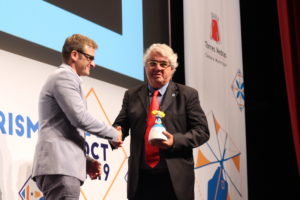
Paulo Castro, the Vice-President of EUROPARC Federation at the ART&TUR Festival Award ceremony.
Since its 1st edition in Barcelos in 2008, the ART&TUR International Tourism Film Festival has been following the mission of making known to the world the best tourism-related audiovisual productions in Portugal and in the world.
This year, the 12th edition of the Festival took place from 22nd to 25th October 2019 in Torres Vedras, Portugal. In this edition, films were submitted from 52 countries from all continents. In total 331 films were competing: 219 films submitted to international competition and 112 films submitted to national competition.
Measure the Ecological Footprint of your Ecotourism Itineraries
Source: Global Footprint Network
Does your Protected Area offer ecotourism itineraries and sustainable destinations? Find out what is their Ecological Footprint with DestiMED’s Calculator. The Calculator enables to measure and monitor the Ecological Footprint, based on the 4 main aspects of an ecotourism package, i.e. accommodation, food & drinks, mobility & transfer activities and services.
Free online calculator
To help Protected Area managers and tourist operators in creating a proven sustainable experience, the DestiMED project has created this free online calculator to measure the Ecological Footprint of ecotourism itineraries.
Ecotourism is a great tool to promote the unique value of nature and Protected Areas, while creating revenue for local communities.
The calculator was created with the support of the European programme Interreg-MED and addresses mainly Protected Areas of the Mediterranean region. It evaluates 4 main aspects of ecotourism packages:
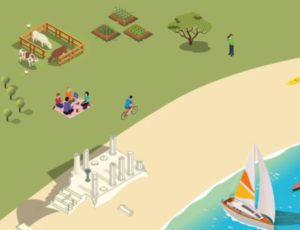
Source: Global Footprint Network
- Accommodation
- Food and Drinks
- Mobility and Transfer
- Activities and Services
The assessment is conducted annually to help the local ecotourism businesses and public authorities understand and address the impact of their ecotourism products while ensuring their high quality.
What is the Ecological Footprint?
The Ecological Footprint is an indicator and a methodology developed by Global Footprint Network to measure the ecological assets required by a given population to produce the natural resources it consumes, and to absorb its waste, especially carbon emissions.
The DestiMED Project managed to adapt this methodology to ecotourism packages in Protected Areas. Moreover, the tool offers specific information on:
- The Ecological Footprint of the whole ecotourism package (in gha per package)
- The Ecological Footprint per tourist per day (in gha per tourist per day)
How to use the Calculator?
To get started, you will need to register on the platform by creating a new account. All the steps are then explained in an introductory video.
Entering the data
For each ecotourism package, you will be requested to provide the number of days and of participants. In each of the categories (accommodation, food & drinks, mobility & transfer activities & services) the questions will focus on the type of supply and how it is provided.
It is strongly recommended to get in touch with your service providers involved in the package (all the hotels, restaurants, providers of transport and guides/providers for each activity) and to visit them in person to ensure that data is collected as precisely as possible.
Lower your Ecological Footprint
Results from the DestiMED project illustrate that a low Ecological Footprint of tourism can be achieved by:
Staying at small-scale, family-run, local and traditional housing accommodations, preferably with renewable energy sources in place. Although large hotel chains are often very resource efficient because of economies of scale, these small-scale hotels will reduce the accommodation Footprint by as much as 48%, Global Footprint Network found.
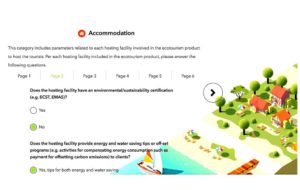
Source: DestiMED project
Eating food sourced locally or regionally, offered through the typical Mediterranean diet providing an abundance of vegetables and grains, and less animal protein-based products (non-endangered fish-based products and non-intensive meat based-products).
Buying local and organic food products improves each meal with a tasty Footprint reduction of 5%, Global Footprint Network found. This can really add up over the course of a trip! Considering the quantity of food consumed: light and balanced dishes are favored over lush, bountiful, and never-ending banquets.
Carbon-free activities that allow you to enjoy the slow pace of the natural areas and re-discover the original rhythm of nature.
Traveling “slow” by using alternative and motor-free modes of transportation as much as possible. Walking, as well as using bikes, kayaks, horses, or even public transport, is preferred to carbon-intensive transportation. An electric vehicle will help reduce the Footprint by 40-50%, Global Footprint Network found, and a bike ride means no Footprint at all!
For further enquiries contact carla.danelutti@iucn.org.
